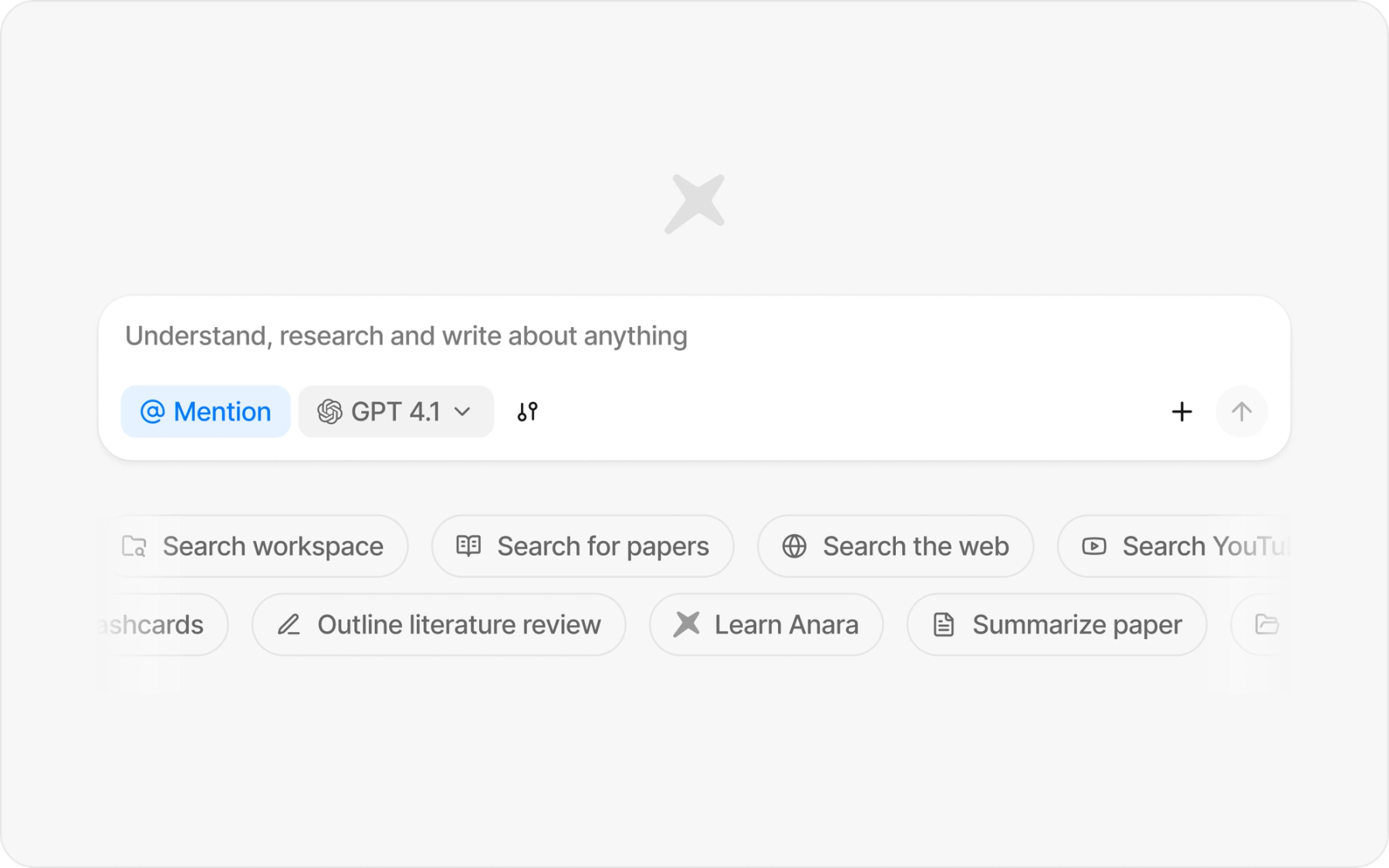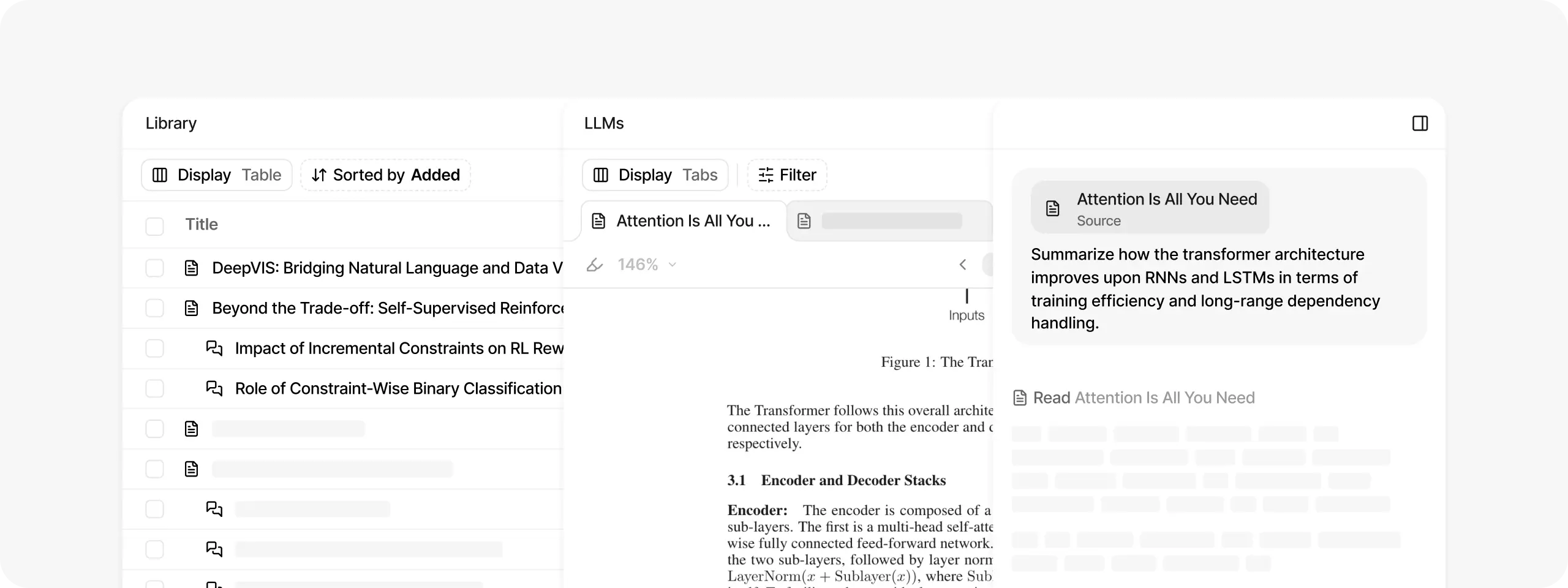8 AI tools like ChatGPT built for research
ChatGPT can help with early brainstorming or discovering papers, but it’s not built for academic research.
If you’ve used it for literature reviews, managing citations, or analyzing PDFs, you’ve probably hit its limits. Researchers need AI tools like ChatGPT that can process complex papers, provide reliable citations, and support collaboration.
The platforms below do exactly that. The list is based on guidance from top university libraries, like Michigan, Purdue, UNC, NYU, and backed by academic studies on AI effectiveness in research.
These are the best ChatGPT alternatives for researchers—not the general public.
1. Anara
Anara is one the best ChatGPT alternatives built specifically for research workflows through specialized AI agents. Unlike ChatGPT's general-purpose approach, Anara is designed for specific research tasks: accessesing academic databases, synthesizing insights across multiple sources, and automating systematic data extraction.
With access to premium AI models like Claude 4 Sonnet and GPT-4, you get verifiable answers grounded in academic sources rather than ChatGPT's potentially unreliable general knowledge. Every response includes "source highlighting" that links to exact passages in source documents, eliminating the citation fabrication problems that plague ChatGPT.

Key features
- Multi-source research: accesses research papers from PubMed, arXiv, JSTOR with @Search Papers or synthesize insights from your library, databases, and web sources simultaneously using @Research.
- Systematic data extraction: @CompleteForm automates template-based analysis across literature—perfect for systematic reviews that would overwhelm ChatGPT.
- Chunk highlighting verification: Every response links to exact source passages, eliminating ChatGPT's hallucination and fake citation problems.
- Multimedia research support: Anara's multimedia analysis handle video lectures, interviews, and visual data.
- Persistent research memory: All chats, extracted data, and insights are saved and searchable through @SearchWorkspace—unlike ChatGPT's session-based limitations.
- Academic collaboration: Shared workspaces, real-time editing, and team libraries enable research collaboration.
- Automated citation generation: @CreateCitation produces properly formatted references while @CreateFlashcards transforms research into study materials.
Anara's source highlighting shows me the precise section where data comes from, so I can understand the context and share accurate information with my team.
A chemistry PhD turned clean tech CTO
Workflow example
A medical researcher studying cancer navigation had collected 50+ papers in their Zotero library from Google Scholar searches. Using Anara’s Zotero GPT integration, they imported these papers directly into the platform via the Zotero connector. They could then ask targeted questions like "What are the functions of cancer AI programs in Africa?" and receive answers with source highlighting that pinpointed exact sections within the papers. This dramatically reduced reading time while preserving their organized workflow for citations and enabling deeper, GPT-assisted literature exploration.
Pricing
- Free Plan: 10 basic + 4 pro messages daily, 10 uploads/day - Sign up now!
- Pro Plan: $12/month for unlimited messages and uploads, premium AI models (Claude 4 Sonnet, GPT-4, etc.)
- Team Plan: $28/month/user includes everything in Pro plus team management, shared editing, admin controls, and dedicated account manager
2. Elicit
Elicit specializes in academic paper discovery and systematic reviews with access to 125M+ academic papers. It uses language models like GPT-3 to automate literature review. You can ask questions and Elicit will find relevant papers and summarise key information about them in a table, making it a reliable ChatGPT alternative for scientists and academics.
Key features:
- Natural language search across academic literature
- Automated data extraction from research papers
- Comparative analysis and meta-analysis support
- Systematic review workflows
- Integration with Zotero
Workflow example
Ask questions like "How do mental health interventions vary by age group?" and Elicit returns:
- Summary of top 4 papers with titles, abstracts, citations, and PDFs
- Table view showing abstracts, interventions, outcomes measured, and number of participants
- Detailed metadata about each source including population demographics, intervention duration, results, and methodology (University of Michigan Library guide)
Pricing
- Plus: $12/month
- Pro: $49/month
- Team: $79/month per user
- Free tier available
3. Scite
Scite is an alternative to ChatGPT for academic research because it offers structured, citation-focused insights. It shows how papers are cited with context (supporting, contrasting, or mentioning) across 200M+ articles and 1.2B+ citation statements. It gives researchers clear context for how the research is being used. Scite also enables citation chaining (forward, backward, and co-citations), similar to tools like Web of Science or Scopus.
Key features
- Smart Citations showing citation context
- Research credibility validation
- Citation analysis for systematic reviews
- Reference reliability assessment
- Academic institutional focus
Workflow example
- Upload your manuscript draft and get a reference check showing which papers have been retracted or heavily contrasted.
- Use Smart Citations to see if your key references are actually supported or contradicted by subsequent research.
- Export citation contexts to spreadsheets for systematic review tables (Purdue University guide)
Pricing
- Custom pricing for institutions
- Academic discounts available
4. SciSpace
This ChatGPT alternative for researchers can read and analyze PDFs, explains research methods, and convert documents to audio/video formats. SciSpace is popular among researchers working with dense academic PDFs who need integrated analysis and organization tools.
Key features
- Direct PDF analysis and explanation
- Research workspace for organization
- PDF-to-audio/video conversion
- Citation generator
- Chrome extension for research
- AI writing tools
Workflow example
- Upload dense academic PDFs and ask specific questions like "What methodology did this study use?" or "Summarize the limitations section."
- Convert important papers to audio format for listening during commutes.
- Organize related papers in workspaces for comparative analysis.
Pricing
- Premium: $30/month ($12/month annually)
- Free basic plan
5. Consensus
Unlike ChatGPT, Consensus is an AI search engine focused exclusively on peer-reviewed scientific literature with research quality indicators. It's an alternative to ChatGPT for researchers wanting precise, evidence-based answers backed by scientific literature.
Key features
- Database of 200M+ scientific papers
- Research quality indicators and summaries
- Evidence-based answers from literature
- Copilot features for research guidance
- Student discounts available
Workflow example
Ask research questions and get synthesized answers from scientific literature with quality indicators for each study. The tool can handle "questions on relationships between concepts, yes/no questions, and the effects of a concept" (Chicago School Library).
Pricing
- Premium: $9/month (student discounts available)
- 20 free credits monthly
6. NotebookLM
NotebookLM is a ChatGPT alternative for students and researchers who want AI writing assistant and answers grounded in specific documents rather than general web knowledge. It's a tool from Google that uses Gemini 2.0 engine to read, summarize, and chat with your specific uploaded documents.
Key features
- Source-grounded AI that references only your materials
- Audio overview feature that creates podcast-style discussions of your research
- Interactive chat with citation tracking to original documents
- Study guide and FAQ generation from uploaded materials
Workflow example
- Upload your course readings, research papers, and notes into one notebook
- Ask questions like: "Compare the methodological approaches across these three studies" or "Create a study guide with key terms from these materials." (University of North Dakota guide)
Pricing
- 1-month free for individuals to get started
Related: Best AI tools to read research papers.
7. Scholarcy
Researchers use this tool instead of ChatGPT for academic reading assistance. It automatically summarizes articles, creates flashcards, and generating bibliographies with AI specifically trained on academic content. It's a great research app for students who need to process large volumes of academic literature quickly while maintaining organized research libraries.
Key features
- Automatic article summarization with key statement highlighting
- Flashcard generation from research papers
- Personal research library with searchable summaries
- Direct links to referenced sources
- Bibliography and citation management
- Integration with Zotero and other reference managers
Workflow example
- Upload a complex research article and Scholarcy extracts key statements to: Kickstart your paper writing
- Create study flashcards for review,
- Build a searchable library of all your research summaries (Miami Dade College guide)
Pricing
- $9.99/month
- Free tier available
8. Research Rabbit
Research Rabbit visualizes research connections as interactive networks, showing relationships between papers, authors, and topics. It's great ChatGPT alternative for academics seeking to understand broader research contexts, discover connected work or find research gaps.
Key features
- Network visualization of research landscapes
- Discovery of related work and connections
- Research mapping and exploration
- Author and topic relationship analysis
Workflow example
- Start with one or two "seed papers" on your topic and upload them to create a collection
- Research Rabbit then maps connections through citation networks, showing green nodes for your papers and blue nodes for recommendations
- Use the timeline view to see when related work was published and explore "Similar Work," "Earlier Work," and "Later Work" categories (University of California Merced guide)
Pricing
- Free to use
Related: The latest AI statistics in education.
Tips for using AI tools like ChatGPT in research
Based on guidance from university libraries and researchers, here's how to integrate AI tools in your research:
University of North Carolina guide recommends starting small. Don't replace your entire workflow immediately. For example, begin with early-stage gathering of sources and topic development assisted by AI research tools. Use them to supplement, not substitute, traditional database searching .
According to New York University verification is key. You should always verify information by referring to actual articles, as AI tools don't search all relevant literature and may miss nuances that manual review would catch. Check for retractions and validate extracted data.
Build your personal research collection with source highlighting
Sign up for AnaraLimitations to consider when choosing a research alternative to ChatGPT
None of ChatGPT alternatives for researchers completely replace human critical thinking, methodology evaluation, or academic writing skills. All require researchers to understand the underlying literature and verify AI-generated insights, especially for high-stakes academic work.
Here are some tools' limitations you may consider while choosing a replacement:
- Elicit is limited to open access full texts; confined to Semantic Scholar database; may miss nuances that manual review would catch.
- Scite focuses only on citation context, not content analysis; relies on publisher integration for coverage.
- NotebookLM is limited to Google's ecosystem; requires Google account; limited collaboration features; focuses primarily on note-taking rather than comprehensive research workflows.
- Consensus is limited to specific research questions with quantitative answers; narrow database coverage compared to comprehensive research platforms; doesn't support multimedia content analysis or collaborative workflows.
